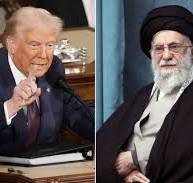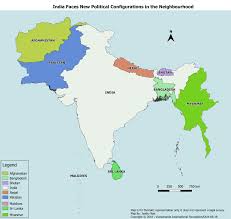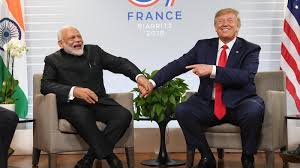How various players in West Asia position themselves in the next few months would determine whether the region finds peace or face military attacks and counterattacks
by Prasad Nallapati*
“Negotiate a `Deal’ on my terms or face tariffs, humiliation and military action,” that’s the essence of Trump’s policy of MAGA (Make America Great Again). Commercial interests are at the core of the policy but larger strategic interests are also intertwined.
It seems working as of now as country after country is falling in line, some zealously, some grudgingly, though.
Some look at it as an opportunity to have the US on their side against regional adversaries in return for economic dividends, like Congo. President Tshisekedi offered `rare earth’ mining resources in exchange for help in defeating the dreaded M23 rebel group, backed by neighbor Rwanda.
Some others are offering terror `assets’ under their watch to curry favour with the Trump administration, like Pakistan. Islamabad handed over to the US earlier this month Mohammad Sharifullah, a senior commander of the Islamic State (Khorasan) and the mastermind of the suicide bombing at the Kabul airport on August 26, 2021 killing 13 American soldiers.
`Mega Deals’
But the `Mega Deals’ that President Trump is keen on are with Russia and China.
In a lengthy interview with Fox News on March 18, he said that the US is “a much different country than we were a few months ago” and would now be friendly with both Russia and China. “With Russia, we don’t have that much trade….They have a lot of valuable things for us, including very big forms of rare earth,” he added.
There appears to be more to it than just commercial benefits. Trump wants President Putin on his side in dealing with nuclear Iran. Russia has been helping Iran’s civilian nuclear energy program.
Notwithstanding a 20 per cent tariffs on Chinese products and the latter’s reciprocal measures, the two sides are in contact with each other for a larger trade agreement, the first phase of which was signed during Trump’s earlier term but never implemented as he lost the 2020 election.
Trump is also keen on a Strategic Nuclear Arms Treaty with Russia and China, though the latter has not shown any interest. He is preparing for summit meetings with both Putin and Xi Jinping.
Will Trump’s MAGA Policy Succeed In West Asia
While most countries are preparing for negotiations including Europe, the one region that is still resisting Trump pressures is West Asia.
Trump plans to build a commercial empire in the region around Israel’s security interests. Gaza has already been demolished by Israel in response to the Hamas’ raid in October 2023 abducting 251 people including children and women.
Trump wanted Palestinians to leave Gaza for a “better” life elsewhere in Egypt and Jordan, while he turns it into a new `Dubai’. An Arab summit in Cairo, however, rejected the plan and Egypt is fortifying its borders to prevent mass migration of Palestinians.
President Trump sent a letter to Iran’s supreme leader, Ayatollah Ali Khamenei, on March 5 setting a two-month deadline to negotiate a new nuclear deal or face possible military action.
National Security Adviser Michael Waltz made it clear that Iran must “hand over and give up” all elements of its nuclear program. “If Iran doesn’t hand over .. the missiles, the weaponization, the enrichment of nuclear materials, they can face a whole series of other consequences,” he added.
The US and Israeli officials are meeting next week to take stock of Iran’s nuclear program.
It was also discussed by Trump and Putin in their telephone conversation on March 18 after which the White House said the two leaders “shared the view that Iran should never be in a position to destroy Israel.”
Putin has agreed to mediate between the US and Iran on the latter’s nuclear issue. Kremlin has, however, stated that Iran has the right to peaceful atomic energy and is acting in line with international law.
Iran has refused to bow to American demands as it sees them as an attempt to decapacitate its missile program. Iran has become increasingly vulnerable after Israeli airstrikes last October that had neutralized its air defense systems and disrupted its ability to produce ballistic missiles.
Tehran, therefore, wants to prioritize their missile program to establish a deterrence against Israeli and US threats. It unveiled its latest precision-guided ballistic missile called the “Etemad” last month with a range of 1,700 kilometers that can reach key targets across Israel.
Iran has also been coordinating with its security partners, Russia and China, for a joint posture against American threats. Iran has a Treaty of Comprehensive Strategic Partnership with Russia signed in January this year, while it has a 25-year cooperation agreement with China, signed in 2021, encompassing strategic, political and economic components.
Representatives of the three countries met in Beijing on March 14 and described Iranian nuclear activities as “exclusively for peaceful purposes,” and demanded to “lift all illegal unilateral sanctions” imposed on Tehran.
Iran also appears to be reactivating its `axis of resistance’ with new threats emanating from pro-Iranian groups in Yemen, Iraq, Syria and Lebanon.
The Houthis in Yemen announced to resume attacks on Israeli ships in the Red Sea which was responded to by the US with massive air strikes that targeted the group’s camps killing over 30 people. The Houthis retaliated with attacks on US aircraft carrier and destroyers in the Red Sea.
Trump warned Iran of `dire consequences’ if the Yemeni group continues its attacks.
A new Shia group, Ya Ali Popular Formations, was formed in Iraq to target the members of the Hayat Tahrir al Sham (HTS), the leading party of the ruling dispensation in Syria. Other pro-Iran groups in Iraq are also cautioned to prepare for American attacks. Pro-Assad elements are reportedly coordinating with Hezbolah-affiliated smuggling networks along the Syria-Lebanon border for military supplies.
Iran, however, kept its diplomatic doors open with its Foreign Minister Abbas Araghchi acknowledging that Trump’s letter also presented some opportunities and Tehran is evaluating its response.
At the same time, its clerical leadership is not desperate like Ukrainian President Zelensky to bow to US threats. It has weathered decades of harsh sanctions and military actions and will not hesitate to sit tight even in face of further military attacks.
Even if Israel and the US launch attacks targeting its nuclear installations in the absence of any agreement, that may prove to be a temporary set back for Iran but will expose the limitations of Trump’s threats. That will only build more resistance to his vociferous intimidations world wide.
How various players in West Asia position themselves in the next few months would determine whether the region finds peace or face military attacks and counterattacks.
(*Prasad Nallapati is President of the Hyderabad-based think-tank, “Deccan Council for Strategic Initiatives” and former Additional Secretary to the Govt of India)




